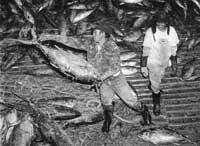Tuna in the end?
In the world's oceans, tuna is increasingly scarce. In the Gulf of Mexico, for example, since 1975 there is 90% less and in the Mediterranean it has dropped by half. In this march, experts assure that the species will soon be hidden.
At the meeting held two years ago in the Japanese city of Kyoto, the Swedes proposed prohibiting the fishing of bluefin tuna, something that was not decided. The United States, Canada and Japan are the main countries that are taking advantage of tuna fishing. Let's say that in Tokyo the kilo of tuna is paid 770 dollars and the United States receives 30 million dollars selling each year to Japan.

Because of the economy, this year tuna fishing will be reduced by only 15% and next year by 50%, although experts recommend that this year approach half to protect the species.
The situation of other species is also very serious. In Canada, for example, excessive cod capture has temporarily forced fishing across the east coast to be banned. In the Pacific, for its part, fish called halibut can only be caught two days a year.
However, recently fishing methods and techniques have been greatly improved. For this reason, in 1975 it was fished for two days as 125 days of fishing. As a result, there are fewer fish and more unemployed fishermen, while materials and technique advance.
The solution may be to set a maximum catch per campaign fee for each angler, fisher and company. This would prevent current competition and prevent overexploitation of the sea.
Buletina
Bidali zure helbide elektronikoa eta jaso asteroko buletina zure sarrera-ontzian











